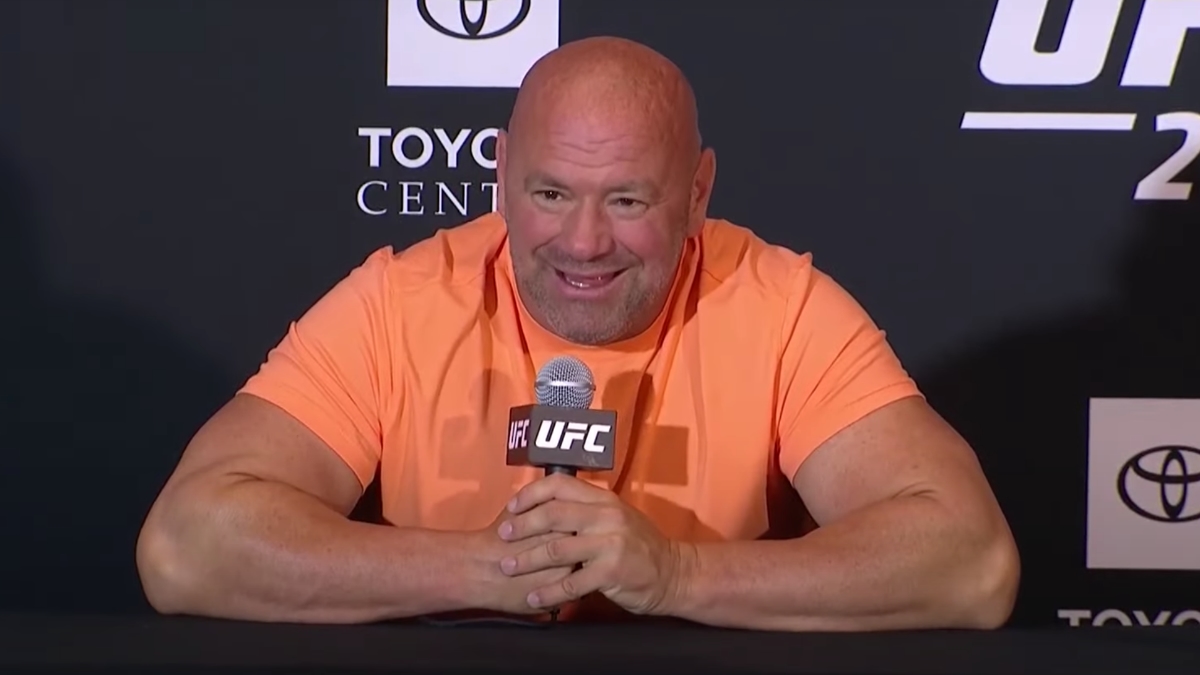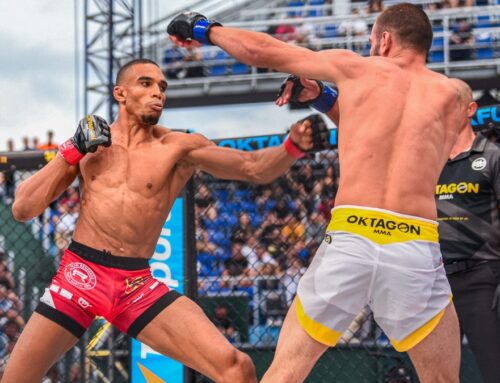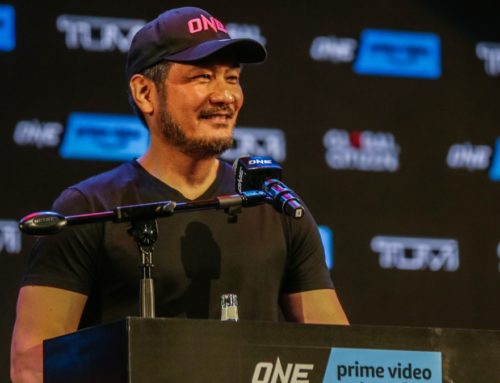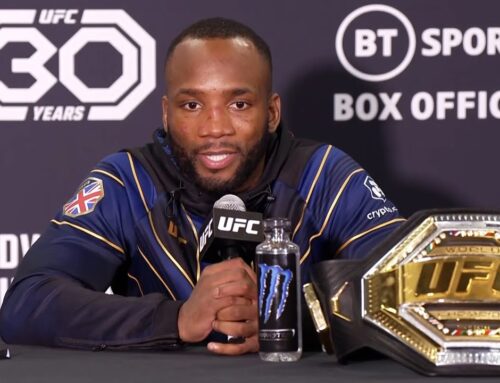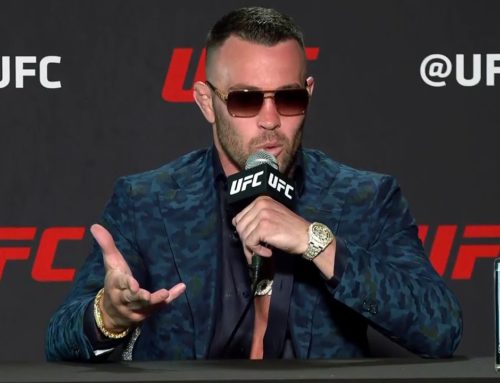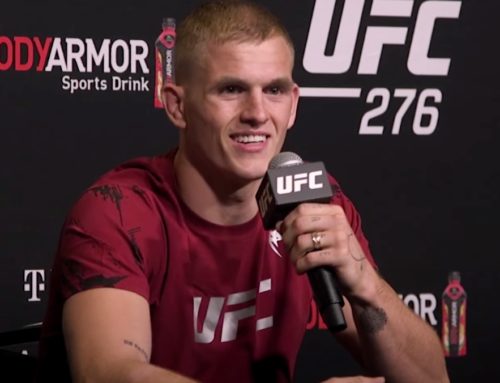Over the past two decades, Dana White has steered the UFC to the sporting mainstream, but despite a remarkable run at the helm of the promotion, the 52-year-old is far from finished. Now he’s targeting global domination.
Speaking to Bloomberg as part of a feature on the business of sports, White lifted the lid on what has made the UFC such a success across the past 15+ years and outlined his plans for the next chapter in the MMA promotion’s growth and development.
It all started for White when he teamed up with Las Vegas casino magnates and lifelong friends Lorenzo and Frank Fertitta, who purchased the then-struggling UFC brand for $2 million in 2001.
With the Fertittas providing the financial clout and a ballsy, can-do attitude and White leading the way as the UFC’s president, the company negotiated the difficult early waters that saw the organisation fight against a near-nationwide ban to, state by state, get the sport legalised, while also winning the fight to get the sport on free TV, thanks to a huge financial gamble – the inaugural season of “The Ultimate Fighter.”
Looking back at the early days of his UFC involvement, while chatting from the UFC’s multi-million-dollar headquarters in Vegas, White recalled the early challenges that stood between him and the Fertittas and commercial viability for the promotion.
“The landscape and the back yard is worth $2 million. It’s crazy!” he smiled.
“We bought the company, and this wasn’t allowed on pay-per-view. Porn was on pay-per-view, and you could pay for it, but you could not pay for the UFC.
“We bought the company and our goal was to get it onto free TV, which everyone thought was impossible at the time.”
However, the Fertittas’ $10million gamble on “TUF” paid off, with the self-funded first season proving a huge hit on male-targeted channel Spike. A second season was immediately commissioned, and White and the UFC never looked back.
It meant that, over the course of 15 years, White and the Fertittas grew the UFC from an edgy underground brand to a nationally and internationally recognised sports league before the Fertittas sold the UFC to entertainment giants WME-IMG for a colossal $4 billion in 2016.
While the Fertittas stepped away, White remained front and centre as the UFC’s president and, when the promotion was later fully owned by Endeavor, White continued in charge, with the Bostonian pulling the operational strings from his Las Vegas base while Hollywood super-agent Ari Emmanuel (the inspiration for Entourage’s iconic character, Ari Gold) oversaw the company’s overall strategy as a sports and entertainment entity from Endeavor’s HQ.
Fight nights on Spike and pay-per-view eventually led to a game-changing deal with FOX Sports that put the UFC alongside the likes of the NFL in the sporting landscape.
Then, the UFC turned things up to 11 by striking a multi-year deal with the daddy of all sports broadcasters, ESPN, in a package worth $1.5 billion over five years.
But while the financials of the deal may have caught the eye, the deal was even more significant for the level of exposure the UFC would go on to receive, as White explained.
“You think you want to be on ESPN, you think that’s where you need to be as a sport. You don’t really realise the impact until you get on ESPN. The impact is massive,” he said.
“Turn your TV on at three o’clock in the afternoon. Three o’clock in the morning, 6am. That bug is up there that says ‘Conor McGregor versus Poirier.’ Every single week, that’s up there. And these fighters’ names start to drill into people’s heads.
“You do that over a seven-year period, it’s massive. Not just for the brand, but for the individual fighters, too.”
The ESPN deal put the UFC in a completely different sporting stratosphere in terms of its position in the American sporting consciousness. And that brand knowledge got even stronger during the most difficult period for sports – and just about everything else – in a generation, as the COVID-19 pandemic swept the globe.
White was determined to be the first sporting organisation to emerge from the global lockdown, and the UFC’s agility as an organisation allowed them to not only return first, but return successfully, as White made good on his word as the UFC returned to our screens as just about the only live sports show on television.
One of the key reasons why the UFC was able to get the jump on other, longer-established sporting organisations such as the NFL and the NBA was due to the way the UFC is run, as White explained.
“I think the big difference in what makes us, I wouldn’t say better, but easier to manage than those things, there’s one guy that makes all the decisions, and that’s me. I make all the decisions,” he stated.
“When I decide we’re going to do something, we’re doing it!”
The UFC’s swift return proved to be a win-double for the organisation. Not only did it mean they could offer events for their contracted fighters to compete in and get paid for, it also allowed the UFC to grow its popularity with sports fans and sports bettors across the world as the organisation did a remarkable job of adapting its live event offering for the lockdown era, with behind-closed-doors events becoming the norm before regulations started to ease to allow the return of packed houses once again.
“It’s one of the things I’m the most proud out of my entire 20-year career with the UFC is that we didn’t lay off any of our employees and we honoured all of our fighter contracts and everybody made a living and got paid through COVID,” said White.
“Through the pandemic obviously we gained a lot of fans because we were the only thing on TV. People tuned in and people watched. We gained a lot of fans because there was nothing to gamble on, so sports bettors started betting on UFC. And if you’re going to start watching UFC, you’re going to love it. There’s no way that is isn’t exciting to you and not fun to watch.”
Now, with the sporting world back on its feet and fans back in the stands once again, the UFC has arguably never been in better shape as it heads toward the next stage in its short, but remarkable, history.
With the UFC now firmly established in the American sporting consciousness, the next step is to take the promotion’s colossal global reach and maximise it commercially as White and his team look to take the UFC to new levels of popularity across the world.
“When Conor McGregor became a star, he ignited Europe. Weili Zhang… when she became a champion, she ignited China,” he explained.
“When you have someone who looks like you, talks like you and comes from where you come from, and they’re looked at as the baddest human being on planet earth, you rally behind these people and it becomes big. And eventually, when you do this in different parts of the world, it becomes a global sport.
“My long-term goal is to put on fights that are doing five million, 10 million, 15 million pay-per-view buys. This thing is truly the first real global sport. We have no seasons, we go 365 (days), 52 weeks a year.
“This company, from all of my employees, my executive team and to the core unit over at Endeavor, we’re as tight as tight can be, we’re all on the same mission, we’re all on the same page, and we’re a very scary group of people right now.
“We’re going to crush this thing. Shy of a meteor hitting the earth I think we can get through anything.”
Watch the full Bloomberg feature below:

